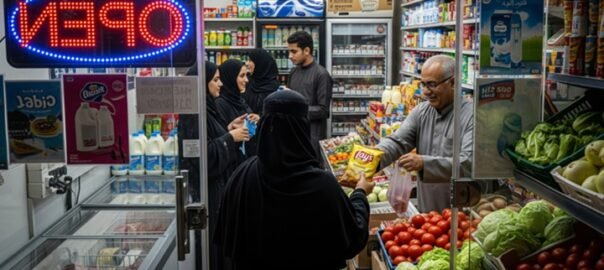
Saudi Arabia bans small grocery stores from selling tobacco, fresh produce, and meat
Saudi Arabia has announced a major overhaul of its retail regulations, banning small grocery stores/convenience stores, commonly referred to as baqalas, from selling a wide range of everyday items, including tobacco products, fresh produce, and meat. The decision, issued by the Minister of Municipalities and Housing, Majed Al-Hogail, was confirmed in a report by Saudi Gazette and takes immediate effect, although existing stores will be given a six-month grace period to comply.
The new regulations affect kiosks, grocery stores, and mini markets, which are now prohibited from selling:
-
Tobacco products (including regular cigarettes, electronic cigarettes, and shisha)
-
Fresh dates
-
Meat
-
Fruits and vegetables
These items are now restricted to larger retail outlets, such as supply stores (supermarkets) and hypermarkets, with an additional licensing requirement for the sale of meat.
Where These Products Can Now Be Sold
While baqalas and smaller outlets face tighter restrictions, the government has clarified where these goods can still be legally purchased:
-
Supermarkets and hypermarkets are permitted to sell all the banned items.
-
Meat sales will require a separate, specific license, even in supermarkets and hypermarkets.
-
Products like charger cables and prepaid recharge cards are exempt from the restriction and may still be sold across grocery stores, supermarkets, and hypermarkets.
This approach, according to the Ministry, aims to aimed at reorganising the retail sector, streamline retail practices, improve health standards, and ensure a better classification of store types based on size and services.
New Space Requirements for Retailers
In addition to the ban on certain items, the amended regulations also establish minimum floor space requirements for different types of stores:
-
Grocery stores (baqalas): Minimum of 24 square meters
-
Supermarkets: Minimum of 100 square meters
-
Hypermarkets: Minimum of 500 square meters
These space requirements are intended to standardize retail environments and further distinguish between small, mid-sized, and large retail businesses in terms of the services and range of products they are allowed to offer.
The government has emphasized that although the rules are immediately enforceable, baqalas and other affected establishments will have up to six months to adjust their operations to become compliant. This transitional period is aimed at reducing the economic burden on small retailers and allowing for a smoother enforcement process.
News Credits- msn









